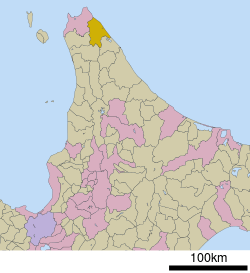Sarufutsu, Hokkaido
| Sarufutsu 猿払村 | |
|---|---|
| Village | |
 Location of Sarufutsu in Hokkaido (Sōya Subprefecture) | |
 Sarufutsu Location in Japan | |
| Coordinates: 45°20′N 142°7′E / 45.333°N 142.117°ECoordinates: 45°20′N 142°7′E / 45.333°N 142.117°E | |
| Country | Japan |
| Region | Hokkaido |
| Prefecture | Hokkaido (Sōya Subprefecture) |
| District | Sōya |
| Area | |
| • Total | 590.00 km2 (227.80 sq mi) |
| Population (December 31, 2007) | |
| • Total | 2,822 |
| • Density | 4.8/km2 (12/sq mi) |
| Symbols | |
| • Tree | Rowan |
| • Flower | Vaccinium vitis-idaea |
| Time zone | Japan Standard Time (UTC+9) |
| City hall address |
172 Onishibetsu-nishi, Sarufutsu-mura, Hokkaidō 098-6292 |
| Website |
www |
Sarufutsu (猿払村 Sarufutsu-mura) is a village located in Sōya District, Sōya Subprefecture, Hokkaido, Japan.
As of September 2014, the village has an estimated population of 2,884 and a density of 4.91 persons per km². The total area is 590.00 km².
Geography
Sarufutsu is the northernmost village in Japan and is the largest village in Hokkaido in area. Located on the Tonbetsu Plain, it faces the Sea of Okhotsk to the east where, during the winter, there is drift ice.[1] 80% of the village's total area is covered by forests.
Settlements/Localities in Sarufutsu
- Ashino (芦野)
- Asajino (浅茅野)
- Chiraibetsu (知来別)
- Hamaonishibetsu (浜鬼志別)
- Hamasarufutsu (猿払村)
- Onishibetsu (鬼志別)(Town Hall is located here)
- Koishi (小石)
Neighbouring municipalities
Economy
Sarufutsu is famous for its large and particularly excellent scallops, among other seafood. Likewise, a relatively large part of the village is utilized for dairy farming. Sarufutsu has a fledgling tourist industry, as it is a highlight for motor bikers in the summer, who stop overnight at one of the biker camps. The tourist center is located a few kilometers south of Hamaonishibetsu.
History
War
Sarufutsu was the site for many Korean prisoners of war from World War II to be sent as labor force for the building of an Air Field in Asajino. Approximately 80 Korean prisoners of war died over the course of construction from abuse or malnutrition. The air field was never completed, and has since lost nearly all signs of its existence. In recent year, the village made attempts to construct a monument in memory of the Korean prisoners who died there. However, construction was forced to be cancelled after Japanese nationalists orchestrated by the Internet began overwhelming the village office with threatening phone calls, calling them traitors, and threatening the village with a boycott of its scallop industry.[2]
Settlements
Koishi
In the 1960s to early-1970s, Koishi was the largest settlement in Sarufutsu with several thousand people working in the coal industry. It had its own hospital, as well as a movie theater. With the decline of the coal industry across Japan, the population also drastically dropped in Koishi, and its current population is less than 50 people.
Asajino
As previously mentioned, Asajino was the potential site for an air field during World War II.
Education
- Primary Schools
- Onishibestu Elementary School
- Hamaonishibestu Elementary School
- Hamasarufutsu Elementary School(Closed starting Spring 2015)
- Asajino Elementary School
- Ashino Elementary School
- Junior High Schools
- Takushin Junior High School
Recreation
- Onishibetsu Sports Center has weekly sports activities for residents and guests.
Summer
- Onishibetsu swimming pool is open during the summer into early fall.
Winter
- Onishibetsu has a small single-lift ski hill.
References
External links
 Media related to Sarufutsu, Hokkaidō at Wikimedia Commons
Media related to Sarufutsu, Hokkaidō at Wikimedia Commons- Sarufutsu official website (Japanese)